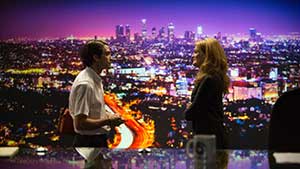What did you think when you first saw Lou Bloom (aka. Jake Gyllenhaal) roaming the surreal Los Angeles landscape that you helped create? Was it worth all those lonely nights, the bad food, the lost sleep?
I certainly think it was.
It must have been a gruelling 28 nights of isolated, thankless work; even though it was punctuated by the excitement of shooting a couple of elaborate car chases and a set piece that is a masterwork of suspense.That kind of compressed schedule means no one sleeps, everyone is on edge, and there's zero room for mistakes. Yet you and your unit managed to deliver a seamless piece of visual art, made all the more effective by Gyllenhaal's Oscar-bait performance.
I feel for you, Mike. I'm sure you've tripped over a few creatures like Lou during in your time in the business. The kind of relentless opportunist – in this case a predatory loner who falls into the murky waters of local TV crime reporting – whose every action is purely transactional, whose each waking second is dedicated to an emotional calculus in search of leverage. Fortunately, though, one of the few perks of the second unit is that you're largely clear of the studio suits. Your work is judged almost exclusively on how well it melds with the aesthetic of the director (in this case first-timer Dan Gilroy).
In Nightcrawler, that aesthetic isn't the time-stamped Los Angeles of Chinatown or even LA Confidential. It's the murky, off-brand L.A. of Michael Mann or Nicolas Winding Refn's Drive. Remote, nameless streets and underpasses. Endless stretches of highway going from nowhere to nowhere. A never-ending ghost town dotted with marginal lives.
You and the first unit worked in perfect concert to capture and sustain that mood. Even the interior scenes were desolate. The term "skeleton crew" was never more apt.
Did you feel a slight kinship to Lou's shadow existence, beginning your work when most other people disappear into sleep? Did he fascinate you the way he fascinated me—like watching a shark circle a wounded fish? Admirably, Gyllenhaal never allows Lou Bloom to betray the purity of your vision of L.A. He lives in perpetual half-light, never exposing himself, except when it's time for him to feed, literally, at the trough of misery (whether accidentally or intentionally). He has the inevitability of a vulture in the desert, the moral compass of a starving hyena.
They are probably functional parallels between your work and the service Lou provides. You both are independent and free of direct supervision, a separate but essential piece of a larger effort. Both of you live and work in the opposite direction of most human's circadian rhythms and see very few people other than those that choose, or are forced, to live that existence.
One other parallel came to mind as I watched this film. If cinema is – and I'm sure you'll agree with me here, Mike – a continuing conversation, then Gyllenhaal's Lou Bloom is flawlessly described in this quote from another, equally vivid film about an organism attuned to its environment: "…a survivor, unclouded by conscience, remorse, or delusions of morality."
To all the Nightcrawlers,
Cheers,
Tim







